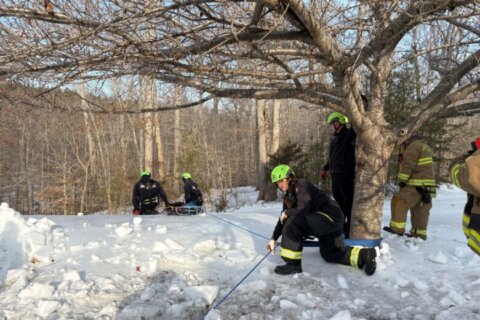This article was republished with permission from WTOP’s news partner InsideNoVa.com. Sign up for InsideNoVa.com’s free email subscription today.
This article was written by WTOP’s news partner InsideNoVa.com and republished with permission. Sign up for InsideNoVa.com’s free email subscription today.
A Prince William County judge has dismissed a lawsuit from a local woman alleging that negligence by current and former Prince William County Public Schools officials led to the woman being sexually assaulted when was a special education student at C.D. Hylton High School.
Judge Carroll Weimer Jr. sided with attorneys for the school officials following a hearing on Friday.
The woman filed the lawsuit Sept. 1, 2021, against former Superintendent Steven Walts, Hylton Principal David Cassady and Special Education Director Michelle Roper.
Although the woman appears by name in court documents, InsideNoVa is withholding her name as an alleged victim of sexual assault. The name of the alleged perpetrator is also being withheld because no formal criminal charges could be found against him.
The legal action alleges that gross negligence by Cassady, Roper and Walts led to “repeated” sexual assaults from November 2016 to January 2017 while the woman was a student at Hylton. It says the woman, who has intellectual disabilities, was a student in Hylton’s special education program and the perpetrator was a student with “a known troubled record involving harmful, sexual, and abusive behavior towards other children and students.”
On Dec. 30, attorneys for Walts, Cassady and Roper filed a plea in bar, which is legal jargon for a motion that essentially argues certain facts prohibit a lawsuit from moving forward.
Bill Porter, attorney for the defendants, argued that because the lawsuit only sued Walts, Cassady and Roper in their official capacity, they are therefore protected by sovereign immunity.
Sovereign immunity is the legal statute protecting governments and government employees from being sued for actions in their official capacity except in very limited circumstances, such as cases of “gross negligence.”
Michael Foley, attorney for the plaintiff, argued that the defendants’ actions went beyond the protections of sovereign immunity.
“We have to protect our children,” he said. “I think we’re setting bad precedent when even cases of gross negligence are being given sovereign immunity.”
Porter emphasized that public employees can be sued for personal liability, but because the lawsuit only referenced official capacity, it was barred from proceeding.
“It is black-letter law in Virginia,” he said. “The law, I believe, is crystal clear.”
Judge Weimer supported Porter’s motion.
“This is tantamount or the same as a suit against the governmental entity,” he said, ”and the governmental entity enjoys sovereign immunity.”







